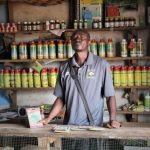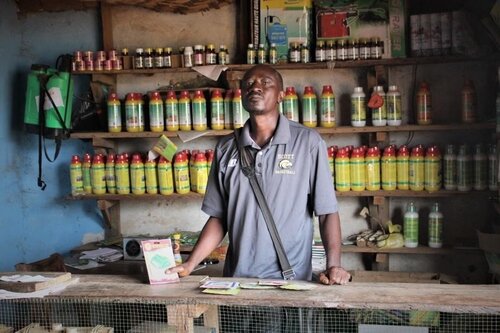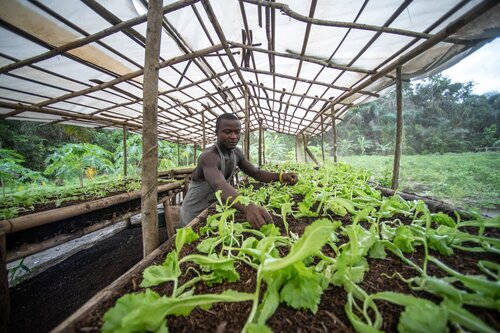
Redesigning Subsidy Programs to Improve Effectiveness
January 9, 2024
A conversation with Hon. Robert K. Fagans, Sr., Deputy Minister for Agriculture
January 9, 2024Liberia is heavily dependent on imports of food, agricultural inputs, petroleum products, building materials, and manufactured goods. A slowdown in global supply chain operations caused by the COVID-19 pandemic led to temporary shortages. Although delays in transportation are expected to continue, widespread supply disruption is unlikely.
The wave of lockdowns across the world, starting with China, led to a drop in exports followed by a global shipping slowdown. This has been sustained by dampened consumer demand.
Many of Liberia’s imports – some 21% of the total in 2019 – come from China, which was the first country to shut down in response to the coronavirus pandemic. Factories closed during lockdowns in January and February, leading to a significant drop in manufacturing output. China’s total exports fell by 17.2% as a result, while year-on-year trade with Africa decreased by 14% in the first three months of 2020.
Although China’s commercial operations resumed in March, there have been lingering difficulties in transporting goods from factories to ports amid health screenings and quarantine measures. Furthermore, significant export backlogs were reported at major Chinese cargo hubs in early May, delaying emergency medical supplies to countries around the world. These disruptions prompted widespread cancellations of container ship sailings as the drop in manufacturing led to a reduced demand for shipping services. Recovery has been hampered by a drop in consumer activity caused by lockdowns worldwide, with some 10% of the world’s container fleet remaining idle. Border closures and commercial flight cancellations are also causing logistical difficulties for crews needing to travel to join ships and return home.
The disruptions experienced in China have echoed throughout the world. Europe became the new pandemic hotspot in March, followed by India, which is an important source of food products for Liberia, and not least rice. Widespread lockdowns across multiple regions have caused difficulties for traders in sourcing products; one Liberian rice importer recounts how India’s lockdown disrupted his company’s operations for several weeks.
Liberian importers experienced delays to cargo arrivals which caused market shortages between March and May.
Most of Liberia’s cargo arrives by sea, and although operations at Monrovia’s Freeport have remained open during the national state of emergency, which was declared on 8th April, the situation in China and elsewhere has caused delays which peaked between March and May.
In normal times, Liberian importers can typically expect to wait 45 days for cargo to arrive from China. Between March and May, some reported waiting up to 80 days. Along with supply chain bottlenecks, reduced manufacturing activity meant that it took longer for ships to fill up before setting sail.
“The impact was felt for a few weeks,” recounts a wholesale trader, who imports fast-moving consumer goods such as tomato paste, seasoning, toothpaste and soap, before selling on to smaller scale distributors and vendors.
Another importer attributes delays and shortages to a global surge in demand caused by panic-buying at the early stages of lockdown. Sugar, oil, and flour, coming mainly from India, Indonesia and Turkey respectively, were in short supply from March. Detergents – and especially hand sanitizer – have also been harder to source.
“Prices went up by 20%,” he says, whilst noting that there has been no change in consumer demand in Liberia.
“Sales were not affected,” agrees the first trader. “People invest in food in tough times.”
While many traders have reported a return to normality since May, some items sourced primarily from Europe, such as agricultural fertilizer, remain scarce in Liberia. One importer describes how an order placed with a company in Belgium in April is still pending, with hopes that it will be fulfilled by July. He adds that shipping is still a problem with cargo taking longer to arrive than usual.
“We’ve had more difficulty with Europe than China,” agrees Cherno Jallah, Sierra Leone Country Manager for TJAL, which imports seedlings, fertilizers, agro-chemicals and tools to its locations in Liberia, Guinea and Sierra Leone from France, the Netherlands, China and Dubai respectively.
Although of lesser importance in terms of volume, air freight options have reduced and prices increased.
Liberia’s international airport closed to commercial passenger flights on 23rd March. While cargo flights have been permitted to continue operating, the suspension of cargo services offered by passenger airlines has reduced options. This has affected TJAL’s supply of seedlings from France, which used to be sent in air cargo on commercial flights.
Importers also reported that the cost of transporting items via DHL, which runs the only scheduled air freight service to Liberia, increased by 10-15% in April and May. Prices have since normalized, but elsewhere in the world the cost of air freight services has increased twelve-fold since the start of the pandemic.
The movement of goods across land borders is permitted, but trade has become harder and more expensive.
Liberia closed its land borders with Guinea and Cote d’Ivoire on 31 March, and with Sierra Leone a day later. While goods have been permitted to cross in spite of the closure, the process of importing has become more laborious and expensive for traders, with informal fee demands by border officials increasing.
One trader observed that a ban on the export of certain items from Cote d’Ivoire, such as hand sanitiser and medical supplies that were in short supply on the domestic market, was being circumvented.
“It’s not too bad,” says Gertrude Gboko, who sells agricultural supplies in the border town of Ganta, in Nimba County. “We can call friends and get goods across. It’s just very expensive.”
The current situation: residual delays and different terms of trade amid continuing uncertainty
Most importers report that their supply chains, particularly those involving China, are returning to normal. There are a few exceptions: wheelbarrows, for example, are currently scarce on the market because the factory in Liberia has experienced delays in importing tires from China.
However, transportation is likely to remain slower than usual while COVID-19 restrictions remain in place. Even where port operations have ostensibly remained open and essential goods have been permitted to cross land borders, there have been inevitable delays to supply caused by quarantines, curfews and other restrictions on movement.
Terms of trade are also changing in some instances as the appetite for risk drops amid uncertainty. A Liberian food importer, who sells in wholesale quantities to supermarkets and smaller stores as well as his own retail operations, describes how he has switched all transactions from credit to cash in response to demands from his own suppliers abroad.
“People tend not to pay in times of crisis,” he says, “and our suppliers want their money to come faster.”
Looking ahead: intermittent but not widespread shortages expected
Intermittent shortages of certain goods – including food products – are likely to continue due to the inevitable delays and disruptions caused by the ongoing global pandemic. Further disruptions to rice supplies in particular seriously threaten food security. Market prices will increase during periods of scarcity.
However, with Asian and European countries seemingly over the worst of COVID-19, widespread and prolonged shortages are unlikely. Emphasis must therefore be placed on protecting and strengthening domestic commercial activities – and not least those linked to agricultural production, such as importers and distributors of input supplies – to protect livelihoods and increase self-sufficiency in the face of an inevitable economic decline.
About GROW Liberia
GROW is an agri-business and investment advisory program that partners with businesses, investors, associations, and government agencies to accelerate inclusive economic returns within high growth industries in Liberia. GROW is supporting public and private partners and markets to respond to the COVID-19 emergency. Learn more about our research, advisory, and support here.




